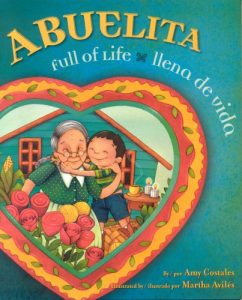After school, Marisol eagerly starts for home to see if her cat, Luisa, has had her kittens. But before she can get there, Uncle Tomás calls to her. He needs Marisol to tell the poultry man that his chickens cost too much. Uncle Tomás cannot speak English so Marisol must do the talking–and she does. Marisol hurries on her way, but soon Auntie Flora stops her for help. Then Mrs. Lopez needs her, too. When Marisol finally gets home, her own mama needs her to hurry to the phone company to straighten out a bill. Luisa will have to wait.
Latinx in US
The Corn Woman: Stories And Legends Of The Hispanic Southwest
The culture, history, and spirit of the Hispanic Southwest are celebrated through 45 fascinating stories and legends from the region. From ancient creation myths of the Aztecs and traditional tales of Spanish colonialists to an eclectic sampling of the work of modern Latino storytellers, this book provides a rich tapestry of both obscure and well-loved stories-religious stories; animal tales; stories of magic, transformation, and wisdom; and chistes (short comic tales). Fifteen tales are also presented in Spanish.
My Colors, My World/Mis colores, mi Mundo
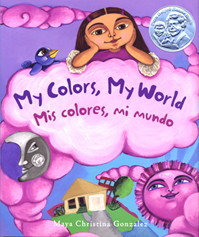
Little Maya longs to find brilliant, beautiful, inspiring color in her world.…but Maya’s world, the Mojave Desert, seems to be filled with nothing but sand. With the help of a feathered friend, she searches everywhere to discover color in her world. In the brilliant purple of her mother\’s flowers, the cool green of a cactus, the hot pink sunset, and the shiny black of Papi\’s hair, Maya finally finds what she was looking for. The book’s appealing narrative and bold illustrations encourage early readers to observe and explore, and to discover the colors in their own
Rene has two Last Names / Rene tiene dos apellidos
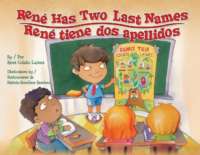
Young Rene is from El Salvador, and he doesn’t understand why his name has to be different in the United States. When he writes Colato, he sees his paternal grandparents, Rene and Amelia. When he writes Lainez, he sees his maternal grandparents, Angela and Julio. His new classmates giggle when Rene tells them his long name. So when the students are given a project to create a family tree, Rene is determined to explain the importance of using both of his last names. On the day of his presentation, Rene explains that he is as hard working as Abuelo Rene, who is a farmer, and as creative as his Abuela Amelia, who is a potter. He can tell stories like his Abuelo Julio and enjoys music like his Abuela Angela.
This book has been included in WOW’s Language and Learning: Children’s and Young Adult Fiction Booklist. For our current list, visit our Booklist page under Resources in the green navigation bar.
Abuelita Full Of Life/Abuelita Llena De Vida
Birthday In The Barrio/Cumpleanos En El Barrio
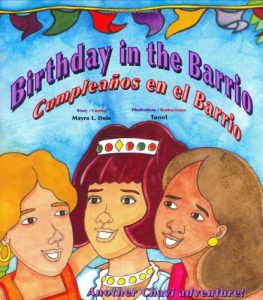 In this second bilingual book by author Mayra L. Dole, lively, determined Chavi sets off on yet another Miami adventure. This time it’s a fifteenth birthday party for her buddy Rosario’s sister that sends her swooshing through her Cuban American neighborhood, recruiting children and grownups to help in the planning and cooking. Once again Chavi proves that she can bring an entire community together for a heartfelt and ultimately very special event.Mayra L. Dole’s bouncy prose and Tonel’s bright, witty watercolors will delight readers who know and love Chavi, as well as those who are discovering this amazing eight-year-old heroine for the first time.
In this second bilingual book by author Mayra L. Dole, lively, determined Chavi sets off on yet another Miami adventure. This time it’s a fifteenth birthday party for her buddy Rosario’s sister that sends her swooshing through her Cuban American neighborhood, recruiting children and grownups to help in the planning and cooking. Once again Chavi proves that she can bring an entire community together for a heartfelt and ultimately very special event.Mayra L. Dole’s bouncy prose and Tonel’s bright, witty watercolors will delight readers who know and love Chavi, as well as those who are discovering this amazing eight-year-old heroine for the first time.
Confetti: Poemas Para Ninos/ Poems For Children (Spanish Edition)
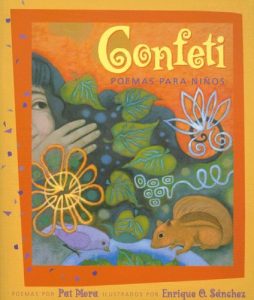 In this joyful and spirited collection, award-winning poet Pat Mora and fine artist Enrique O. Sanchez celebrate the vivid landscape of the Southwest and the delightful rapport that children share with the natural world. Through language that resounds with the harmony of both English and Spanish, Confetti is also an anthem to the power of a child’s imagination and pride.
In this joyful and spirited collection, award-winning poet Pat Mora and fine artist Enrique O. Sanchez celebrate the vivid landscape of the Southwest and the delightful rapport that children share with the natural world. Through language that resounds with the harmony of both English and Spanish, Confetti is also an anthem to the power of a child’s imagination and pride.
El Barrio
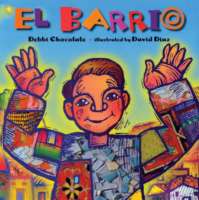
Join a young boy as he explores his vibrant neighborhood. The city shimmers with life—at once a party, a waltz, and a heartbeat. El Barrio is his sister preparing for her quinceañera, his grandfather singing about the past, and his cousins’ stories from other lands. The city is alive with the rhythms of the street. Told in lyrical language and through bold, colorful illustrations, this celebration of Hispanic culture and urban life is sure to fire children’s curiosity about where they live and what they can discover in their own neighborhoods.
Finding Our Way
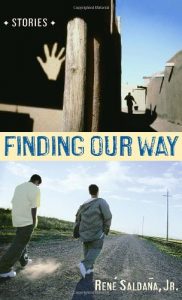 THESE STORIES TAKE the reader to meet mochos; cholos; Mr. and Mrs. Special; Manny with his mysterious phone calls; Melly, who dreams of being the first girl to take the Dive; Andy and Ruthie, who find that being “boyfriend-girlfriend” takes on new meaning the night of the prom; and Chuy, who seems determined to get kicked out of school. Each distinct voice shares secret thoughts that draw the reader into daily dramas of love, danger, loyalty, and pride. In the final story, a shocking tragedy reverberates through the barrio.“With this collection, Saldaña makes a significant contribution to the field of Latino short stories for young readers.”—VOYA, Starred“These powerfully written, provocative selections have universal appeal and subtle, thoughtful themes.”—School Library Journal“While much is revealed, just as much is implied, making the stories layered and rich while still rendering them accessible.”—The BulletinFrom the Hardcover edition.
THESE STORIES TAKE the reader to meet mochos; cholos; Mr. and Mrs. Special; Manny with his mysterious phone calls; Melly, who dreams of being the first girl to take the Dive; Andy and Ruthie, who find that being “boyfriend-girlfriend” takes on new meaning the night of the prom; and Chuy, who seems determined to get kicked out of school. Each distinct voice shares secret thoughts that draw the reader into daily dramas of love, danger, loyalty, and pride. In the final story, a shocking tragedy reverberates through the barrio.“With this collection, Saldaña makes a significant contribution to the field of Latino short stories for young readers.”—VOYA, Starred“These powerfully written, provocative selections have universal appeal and subtle, thoughtful themes.”—School Library Journal“While much is revealed, just as much is implied, making the stories layered and rich while still rendering them accessible.”—The BulletinFrom the Hardcover edition.
My Feet Are Laughing
Sadie, an imaginative young Dominican American, relates her experiences growing up in her grandmother’s brownstone house in Harlem.

